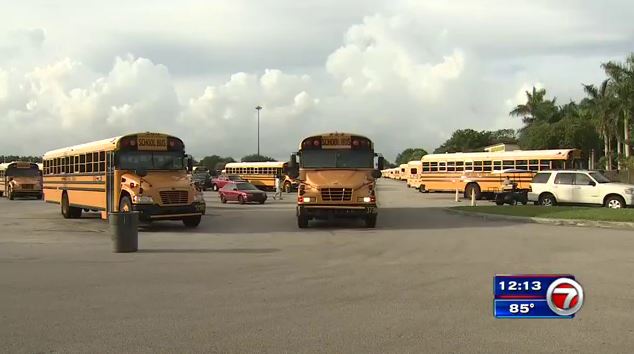CHICAGO (AP) — Teachers in the nation’s third-largest school district will vote this month on whether they want to strike as contract talks with Chicago Public Schools ramp up again.
The last round of negotiations led to a strike in 2012, Chicago’s first teacher walkout in 25 years. This time around, pay and pensions are among the main issues as the cash-strapped district faces uncertainty over state financial help.
The uncertainty with a possible strike looms over the district’s approximately 400,000 students, who started fall classes this week after one of Chicago’s deadliest summers in decades.
Here’s where things stand on negotiations:
WILL THERE BE A STRIKE?
The union, which represents more than 25,000 members, says delegates will take a strike authorization vote starting Sept. 21. They need 75 percent support and to give the district 10 days’ notice before a walkout. If there’s no agreement, the earliest a strike could happen is mid-October.
“There’s never any good time to strike. There is never any good time to not strike,” Chicago Teachers Union President Karen Lewis said as union members met this week. “We will listen to what our members are telling us.”
There’s likely enough support. Roughly 88 percent of voting members authorized a strike in December. The upcoming vote is to provide additional legal cover in case of challenges, according to union officials.
——
WHAT ARE THE ISSUES?
Cost-of-living raises, pension contributions and health care have become central issues since the contract expired in June 2015.
The district has pitched phasing out the longtime practice of picking up most of the teachers’ pension contribution, offering a total base wage increase in a four-year contract. The union wants to preserve the pension pickup and asked for raises in the final two years of a three-year contract.
The union rejected the district’s latest offer earlier this year.
Lewis declined to discuss the latest details, citing ongoing meetings. She said teachers face increasingly difficult circumstances after cutbacks, including for special education, and a violent summer for students.
District officials warned of a strike’s impact, saying both sides have come close to agreement.
“A strike can be averted, and CPS will work tirelessly to make sure children’s education and progress is not interrupted,” said spokeswoman Emily Bittner.
CPS is already experiencing massive financial problems.
Credit rating agencies have rated the district at “junk” status. The district’s $5.4 billion budget relies on increased property taxes, borrowing and $215 million in state money contingent on a statewide pension overhaul. However, Republican Gov. Bruce Rauner and Democrats running the Legislature are locked in an unprecedented battle over a full budget, which has overshadowed other issues at the Capitol. A stop-gap spending plan allowing schools to open on time expires in January.
Schools CEO Forrest Claypool has said if the state doesn’t come through, the district will have to cut money from classrooms.
——
WHEN WAS THE LAST STRIKE?
Teachers staged a one-day walkout in April to protest proposals they said would cut compensation and to highlight state budget problems. District officials lodged an unfair labor practices complaint, calling the strike illegal. An administrative law judge will take up that question in November.
The last major walkout was in 2012, during former White House chief of staff Rahm Emanuel’s first term as Chicago mayor. Teachers picketed for seven days over evaluations, job security and classroom conditions. The union remained among Emanuel’s harshest critics, particularly as he pushed the closure of dozens of schools the following year.
In the end, Emanuel got a school day extension and was able to empower principals to make teacher hiring decisions. Teachers, who received wide support from parents, were able to soften a new evaluation process and win some job protections.
Copyright 2024 The Associated Press. All rights reserved. This material may not be published, broadcast, rewritten or redistributed.

